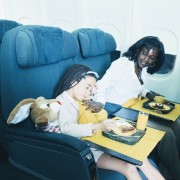 Photo: Getty Images
Photo: Getty Images
Whether you are traveling for business or a family vacation, if you have allergies or asthma you’ll want to take your allergies into account as you make your plans. Your allergens are the things that cause you to have an allergic reaction. If you know what your allergens are, you can take steps to avoid them even when you are away from home.
Packing Tips
Allergy planning starts as you fill your suitcase. Make sure you take everything you’ll need to treat your allergy or asthma symptoms.
• Allergy shots – If you get injections to treat your allergies, make sure you get your shot right before you leave. If you will be gone for more than a couple of weeks, ask your allergist if you should take a dose with you. If you do, you’ll also need a referral to an allergist away from home who can give you the injection.
• Asthma treatments – If you use a peak flow meter or nebulizer to treat your asthma, be sure to pack it. Some nebulizers have an adapter to plug into the car lighter. If you are traveling out of the country, make sure you have the electrical adapter you need for the country you are visiting.
• Pillowcase – If you use special pillows or pillowcases to protect from dust mites, take them along.
• Translations – If you are traveling to another country where another language is spoken, consider having key information about your allergies translated. This can be especially helpful if you have food allergies and need to give specific instructions to a chef.
On Your Way
Whether you are traveling by car, train, or plane, you are probably going to encounter a wide assortment of allergens including dust and dust mites, pollens, and mold spores. Consider these tips to limit allergen contact:
• By Car – Keep the windows rolled up and set the air conditioner to non-recycled air. This will allow outside air to be filtered as it enters the car rather than reusing air from inside the passenger area which may contain dust mites and mold spores from the upholstery and other areas.
• By Plane – Air on board an airplane often contains mold spores and dust mites. Pollens can also be carried into the cabin on passenger clothing. Some airlines allow small animals to travel in the passenger cabin, which can add animal dander and dust to the environment. If you are flying, take your allergy medication before boarding the plane and make sure you have any emergency medications such as an inhaler for asthma close at hand. Be sure to keep your inhaler with you rather than putting it in an overhead bin in case you need it while the “fasten seatbelt” sign is lit. Using a nasal saline spray during the flight can help keep your nasal tissues and help you be more comfortable.
If you have food allergies, check with the airline to find out what their policies are before booking your trip. Some airlines have “nut free” flights to accommodate passengers with peanut allergies. Even if you are on a supposedly “safe” flight, be sure to have an emergency kit with epinephrine just in case.
Home Away from Home
Whether you are staying in a hotel or in the home of friends or family, you are likely to encounter allergens, especially if you are allergic to dust or molds.
• Hotels – Although the rooms are cleaned regularly, mold spores and dust mites are often found in carpets, mattresses, and on furniture. If possible, avoid rooms that are located close to an indoor pool or spa which adds moisture that can encourage mold growth. If fumes from cleaning products are a problem for you, ask for a “green” room. And if you are allergic to pets or smoke, be sure to request non-smoking or non-pet rooms.
• Friends and family – Unless your friends share your allergies, you can expect allergens to be present in any home you visit. Before you agree to be a house guest, find out whether the family has pets if you are allergic to animal dander. Also consider seasonal allergens such as pollens that might be more active in the spring or summer, or sources of dust and mold such as Christmas decorations that have recently come out of storage.
Even if you have allergies or asthma, good planning and smart traveling can help you enjoy your trip with fewer allergy symptoms.
Sources:
American College of Allergy, Asthma & Immunology
American Academy of Allergy Asthma & Immunology
Asthma and Allergy Foundation of America




Add a CommentComments
There are no comments yet. Be the first one and get the conversation started!